4 Tax-Related Tasks Every Business Should Complete before New Year's
 Whether you’re a new business owner or you’re just trying to get ahead of the curve this time around, now is a great time to start preparing to file your tax return. Why should you start before the tax year even ends? Well, there are a few things you can do before New Year’s that may improve your business’s tax situation. Here are a few things every business owner should do before the year ends.
Whether you’re a new business owner or you’re just trying to get ahead of the curve this time around, now is a great time to start preparing to file your tax return. Why should you start before the tax year even ends? Well, there are a few things you can do before New Year’s that may improve your business’s tax situation. Here are a few things every business owner should do before the year ends.
Get Financial Records in Order
One of the biggest slow-downs for filing business taxes is not having the right financials, or waiting for missing documents to be dug up. So, now is a good time to start getting all of those records together, and going over your financials to ensure that all of the numbers are accurate. Double checking these numbers will make the filing process much easier on you, as well as on your CPA.
If you do this now, you’ll be prepared to take your documents to your CPA as soon as your receive any necessary IRS forms, and you can file right away. Additionally, going over those financials now can help you to make important end-of-year decisions, as described below.
Consider Deductible Expenses
After you’ve gone over your financials, you can decide whether or not now is a good time to make some important business purchases. Business-related expenses like new equipment, company vehicles, computers, office furniture, and so on can be deducted on your tax return.
So, if you’ve gone over your financials, have the available funds, and wish to reduce your business’s tax liability, it may be a good time to make those purchases that you’ve been putting off. In addition to buying new equipment, other tax-deductible expenses could include establishing and funding employee retirement plans, selling stock at a loss, and donating to charity.
Additionally, this kind of advanced planning enables you to make decisions regarding “bunching” your expenses. By lumping major business expenses into a single year, you can itemize your deductions to receive a larger tax benefit this year. Then, you can take the standard deduction the following year, when your deductible expenses are likely to be lower. This enables you to maximize your deductions and, therefore, maximize your tax benefit.
Meet with Your CPA
You might think that you don’t need to meet with your CPA until tax season has arrived, and you’re completely ready to file. However, meeting with them before the year ends gives you a chance to get advice on matters like those last-minute deductible expenses, and other ways that you can improve your tax situation.
Many beneficial tax moves must be made before the calendar year ends, so having a meeting with your CPA before the holidays gives you a chance to make adjustments, plan out purchase, and make other decisions that can impact your business tax return.
Double Check Your Deadline
This is especially important for new business owners, or if you have changed your business’s tax year recently. While individual taxpayers know that the tax deadline is April 15th, it’s a bit more complicated for business owners. Your business’s tax deadline can be different, depending on the type of business that you own.
If your business type requires you to use a Schedule C to report your business income (as with a sole proprietorship or single-member LLC), then your business taxes become a part of your individual tax return, and there is no separate filing date. You would file your individual and business taxes together, on April 15th.
If your business is a C-corp, then your tax deadline is the fifteenth day of the fourth month following the close of the tax year. Most businesses’ tax years are the same as the calendar year, which means most C-corps have a tax deadline of April 15th. However, if your business operates on a different tax year, your deadline will be different.
S-corps have a different tax deadline than C-corps; these businesses file their taxes by the fifteenth day of the third month after the close of the tax year. Again, assuming your tax year is the same as the calendar year, this would be March 15th, but will differ if you operate on a different tax year.
Make sure you know exactly what your tax deadline is. The last thing you want is unnecessary fees and fines, simply because you weren’t clear on when your taxes were due.
So, if you’re ready to get ahead of the curve and start preparing for tax season now, contact us to schedule an appointment with one of our business tax experts.